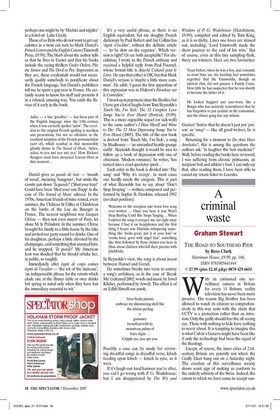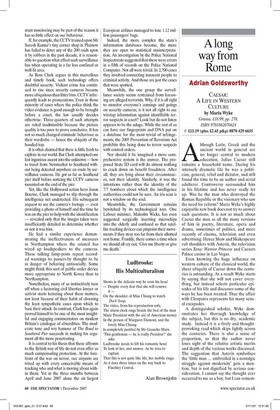A criminal waste
Graham Stewart THE ROAD TO SOUTHEND PIER by Ross Clark Harriman House, £9.99, pp. 168, ISBN 9781905641444 © £7.99 (plus £2.45 p&p) 0870 429 6655 With an estimated one surveillance camera in Britain for every 14 Britons, reality television has never been more invasive. The reason Big Brother has been allowed to watch its citizens so comprehensively in this way rests with the claim that CCTV is a protection rather than an intrusion. Only the guilty should fear the all-seeing eye. Those with nothing to hide have nothing to worry about. It is tempting to imagine this is what Calvin's Geneva might have been like if only the technology had been the equal of the theology.
Except, of course, the inner cities of 21stcentury Britain are patently not where the Godly Elect hang out on a Saturday night. The creation of this surveillance society shows scant sign of making us conform to the orderly sobriety of the Swiss. Indeed, the extent to which we have come to accept constant monitoring may be part of the reason it has so little effect on our behaviour.
If, for example, the CCTV trained upon Mr Suresh Kumar's tiny corner shop in Plaistow has failed to deter any of the 200 raids upon it by robbers in the past decade, it is reasonable to question what effect such surveillance has when operating in a far less confined or well-lit area.
As Ross Clark argues in this marvellous and timely book, such technology offers doubtful security. Violent crime has continued to rise since security cameras became more ubiquitous than litter bins. CCTV infrequently leads to prosecutions. Even in those minority of cases where the police think the video evidence is good enough to be brought before a court, the law usually decides otherwise. Three-quarters of such attempts are ruled inadmissible because the picture quality is too poor to prove conclusive. It has not so much changed criminals' behaviour as their wardrobe — hence the ubiquity of the hooded top.
It is often claimed that there is little fresh to explore in our world. But Clark attempted one last ingenious ascent into the unknown — how to travel from Newmarket to Southend without being detected anywhere en route by surveillance cameras. He got as far as Southend pier itself before noticing the CCTV cameras mounted on the end of the pier.
Yet, like the Hollywood action hero Jason Bourne, Clark managed to slip through the intelligence net undetected. His subsequent request to see the camera's footage — even providing a photo of himself and the time he was on the pier to help with the identification — revealed only that the images taken were insufficiently detailed to determine whether or not it was him He had a similar experience demonstrating the ineffectiveness of measures in Northampton where the council has wired up loudspeakers to the cameras. These talking lamp-posts repeat record ed warnings to passers-by thought to be in danger of behaving antisocially. Some might think this sort of public order device more appropriate to North Korea than to Northampton.
Nonetheless, many of us instinctively turn off when a hectoring civil liberties lawyer or activist starts lecturing about these matters, not least because of their habit of choosing the least sympathetic cases upon which to base their attack. In contrast, Clark has again proved himself to be one of the most insightful and engaging commentators on modern Britain's catalogue of absurdities. The moderate tone and wry humour of The Road to Southend Pier succeeds in making his argument all the more penetrating.
It is central to his thesis that these affronts to the British way of life do not even offer us much compensating protection. At the forefront of the war on terror, our airports are wired up with every conceivable means of tracking who and what is moving about within them. Yet in the three months between April and June 2007 alone the six largest European airlines managed to lose 1.12 million passengers' bags.
Indeed, the more complex the state's information databases become, the more they are open to statistical misinterpretation. An investigation by the Police National Inspectorate suggested that there were errors in a fifth of records on the Police National Computer. Not all were trivial. In 2,700 cases they involved connecting innocent people to criminal activity. And those are just the cases that were spotted.
Meanwhile, the one group the surveillance society seems restrained from harassing are alleged terrorists. Why, if it is all right to monitor everyone's comings and goings on security cameras, is it not all right to use wiretap information against identifiable terror suspects in court? Look but do not listen appears to be the adage. While the rest of us can have our fingerprints and DNA put on a database for the most trivial of infringements, the 2005 Prevention of Terrorism Act prohibits this being done to terror suspects with control orders.
Nor should it be imagined a more comprehensive system is the answer. The proposed State ID card will do almost nothing to crack down on benefit fraudsters. After all, they are lying about their circumstances, not their identity. Similarly, it was the intentions rather than the identity of the 717 bombers about which the intelligence authorities could not be sure. An iris scan is not a window on the soul.
Meanwhile, the Government remains bewitched by its technological toys. One Labour minister, Malcolm Wicks, has even suggested surgically inserting microchips into the elderly and confused so that satellite tracking devices can pinpoint their movements if they stray too far from their allotted rest home. Frankly, there comes a time when we should all cry out, 'Give me liberty or give me death.'






































































 Previous page
Previous page